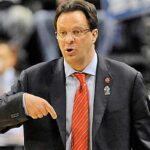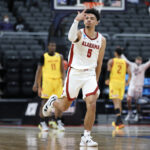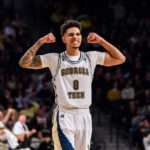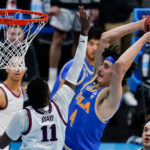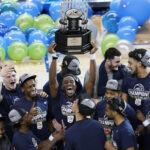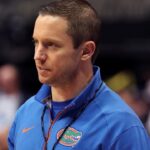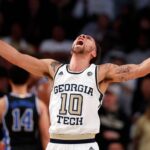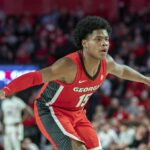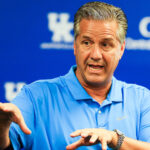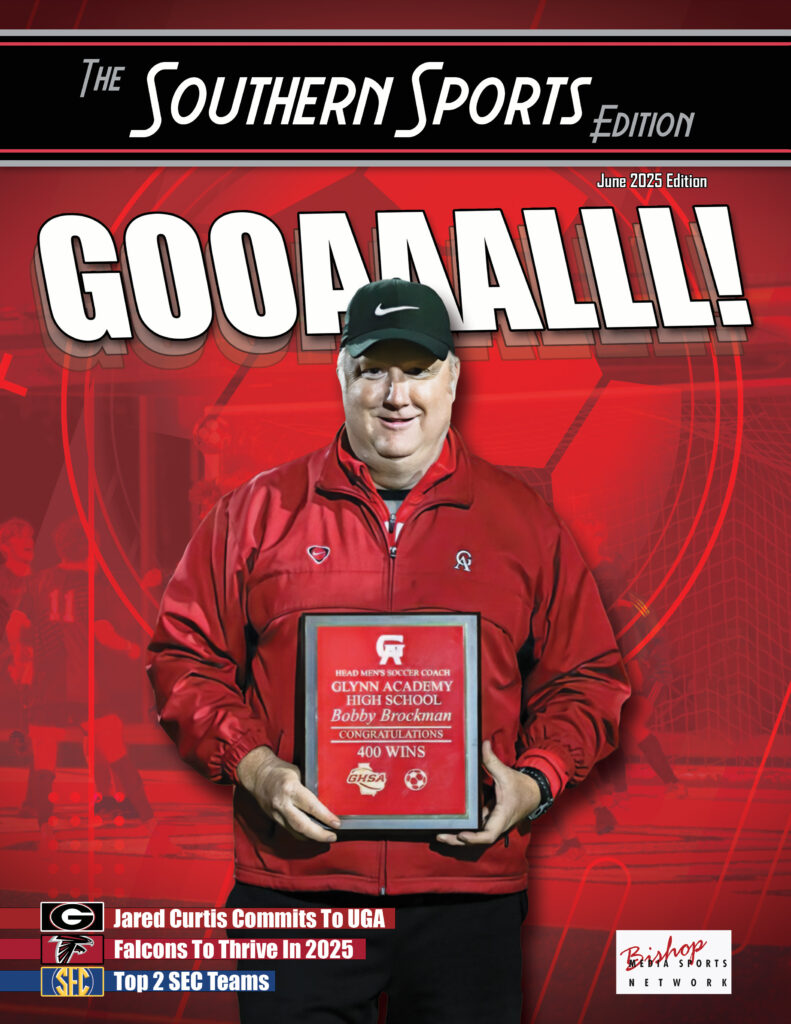College Basketball
Crean Not Rising
 By: Kenneth Harrison
By: Kenneth Harrison
TheSouthernSportsEdition.com news services
Georgia is riding high after winning the national championship in 2021.
They had a historically great defense that helped deliver their first football national championship since 1980. The question is can that inspire some of the other teams in the athletic department?
The UGA men’s basketball team needs some help. They currently sit alone in last place in the SEC. Their overall record is 6 – 15 and 1 – 7 in conference play.
The most recent game was an 85 – 77 loss to Vanderbilt (11 – 9), led by Scottie Pippen Jr. The younger Pippen scored 23 points and dished a season-high 9 assists and Vanderbilt snapped a three-game losing streak, leading from the opening tip. This was the first time the Commodores swept an SEC opponent since 2017.
Aaron Cook led four Bulldogs into double-digit scoring, finishing with 18 points. Kario Oquendo and Noah Baumann each scored 15 points and Braelen Bridges contributed 14 points. Baumann led Georgia (6-15, 1-7) with nine rebounds.
Vanderbilt led by as many as 15 points in the second half after a Pippen layup with less than five minutes to play. The Commodores hit 7 of 11 from 3-point range in the first half and knocked down 12 of 23 overall. Vandy shot 63% from the floor in the first half, hitting 28 of 55 (50.9%) for the game.
Last season the Bulldogs were 14 – 12. Not great but at least they were over .500. They had one returning starter from the 2020-21 team, P.J. Horne. The 6’6 forward from Tifton, GA suffered a season ending knee injury in October.
Head coach Tom Crean had to know then that season would be tough.
“This is such a major blow to us because (Horne) was playing so well and showing great leadership as our leading returning player,” Crean said on Twitter. “But more so because he is such a great person and one of the finest people I’ve ever coached. He cares about his teammates deeply.”
In May, 9 players entered the transfer portal. This is happening to every team but to have that many players enter at once is still shocking.
No team has been hit more squarely in the mouth by player free agency than Georgia. They have been picked nearly down to the bone. From a raw numbers’ standpoint, the Bulldogs have lost 83.4% of their scoring (1,680 points), 72.5% of their rebounding (701) and 72.1% of their 3-point field goals made (119).
One of their best players, K.D. Johnson transferred to Auburn. The Tigers are currently the number one team in the nation. The Bulldogs had the 4-star recruit for all of 16 games, with Johnson missing the first 10 because of NCAA academic eligibility issues. He averaged 13.5 points a game, second on the team.
Another notable name to leave was graduate transfer Andrew Garcia, who transferred to Kent State.
The Bulldogs appear to have done reasonably well with the six transfers they’re bringing in, led by sophomore guard Jabri Abdur-Rahim, who’s coming from Virginia.
Crean has been in Georgia for four seasons and last year was his only winning record. He did go 16 – 16 in 2019-20. The finished 10th in the SEC that year which was the best they have done in his tenure. He has a 47 – 64 record in Athens.
It might be a good time to move on from Crean after this season and rebuild.
SEC Hardwood
 By: Kenneth Harrison
By: Kenneth Harrison
TheSouthernSportsEdition.com news services
We’re about two weeks into the college basketball season. The SEC is known for football but there are several programs ranked in the top 25 in basketball.
It looks like Kentucky will have some competition after a down 2020-21 season. Let’s examine the ranked teams to see who the real contenders are.
#10 Alabama: The Crimson Tide (4 – 0) have been doing well on the hardwood lately. They advanced to the Sweet Sixteen last season and lost to UCLA in overtime.
They also won the SEC Tournament. Alabama finished last season ranked No. 5 in the final AP Poll and Coaches Poll. Those were the school’s highest season-ending rankings since 1956.
Junior guard Jaden Shackelford leads the team in scoring with 19.5 points per game. Junior Jahvon Quinerly averages 15.5 PPG and senior Keon Ellis averages 14.5 PPG.
Alabama heads to the ESPN Events Invitational this week in Orlando, where it will meet Iona on Thursday at 4 p.m. CT in a rematch of its NCAA tournament opener in March. They will play either Belmont or Drake on Friday, with a chance to meet Kansas on Sunday in the finale. The Jayhawks are No. 4 in the AP poll and No. 3 in the coaches poll this week.
# 10 Kentucky: The Wildcats (3 – 1) lost the third game of the season to No. 5 Duke, 79 -71. Last season they finished 9 – 16, their worst season since 1988-89.
Since head coach John Calipari took over in 2009, he’s built the team with the top one-and-done players every season. Surprisingly, out of the top four scorers on the team only one is a freshman.
Freshman TyTy Washington Jr. and junior forwards Oscar Tshiebwe, Keion Brooks all lead the team with 13 PPG.
The next four games are against Albany, North Florida, Central Michigan and Southern. Those should all be blow out wins. The schedule gets tougher after that with games against Notre Dame and Ohio State.
#13 Arkansas: The Razorbacks (3 – 0) are looking to make the NCAA Tournament for the second consecutive year. In 2020-21 they were 25 -7 and advanced to the Sweet Sixteen.
Senior guard JD Notae leads the team with 21.7 PPG. Fellow senior Chris Lykes averages 15.7 PPG.
They have eight games before conference play begins December 29th and only two of those games are against Power 5 teams. They should be undefeated during this stretch.
#15 Tennessee: The Vols (3 – 1) just played some elite teams over the weekend in the Hall of Fame Tip-Off tournament. They were blown out by No. 5 Villanova 71 – 53 on Friday. They rebounded Saturday and beat No. 18 North Carolina, 89 -72. They have some marquee games against Colorado, Texas Tech, No. 9 Memphis and No. 17 Arizona before SEC play starts.
#19 Auburn: The Tigers (3 – 0) have been doing well the last few seasons since Bruce Pearl took over as head coach in 2014. They advanced to the Final Four in 2019 and would have been in the 2020 NCAA Tournament if it was not cancelled due to the pandemic. Last year they were 13 – 14.
They play UConn in the Battle 4 Atlantis tournament in the Bahamas for their next game. No. 24 Michigan State, No. 6 Baylor and Syracuse are potential opponents in the next round.
#23 Florida: The Gators (3 – 0) play Cal in the Fort Myers Tip-Off this week. They will face No. 21 Seton Hall or Ohio State in the next round.
The best team they have played so far is Florida State and they won 71 – 55.
Figuring Out The Ramblin’ Wreck
 By: Kenneth Harrison
By: Kenneth Harrison
TheSouthernSportsEdition.com news services
Last season Georgia Tech made their first NCAA Tournament appearance since 2010.
The Yellow Jackets were 17 – 9 and 11 – 6 in the ACC. They finished fourth in the conference. They won the ACC Tournament by beating 15th ranked Florida State in the championship game. It was their first ACC Tournament Championship since 1993.
Georgia Tech lost in the first round of the NCAA Tournament to Loyola (IL), 71 – 60.
Head coach Josh Pastner was hired in 2016. He was named ACC Coach of the Year in 2017 for leading Tech to a 21 – 16 record. He led them to wins against a top 5 North Carolina team and top-10 Florida State.
Last season’s team was led by senior forward Moses Wright, who was the AP ACC Player of the Year. He averaged 18 points per game and 8.1 rebounds per game. Senior guard Jose Alvaredo was another key contributor from last season that has to be replaced.
This season started with an upset loss at home to Miami (Ohio), 72 – 69. Pastner is now 3 – 3 in season openers at Tech. Miami is the third mid-major from the state of Ohio to beat Georgia Tech at McCamish Pavilion in the last five seasons.
Games like this are supposed to be easy wins. They need as many of those as possible before conference play starts. They bounced back to beat Stetson the next game, 77 – 52.
“We were far from perfect, but when we play with great energy, we’re a good basketball team,” coach Josh Pastner said.
The last game was a 75 – 66 win against Lamar. Lamar has a new head coach and they were 10 – 18 last year. The Yellow Jackets led by 22 points in the first half but looked sluggish in the second half.
“We definitely should have played harder,” said Jordan Usher, who finished with 15 points and a team-high eight rebounds but also turned the ball over four times. “I felt like we came out kind of lethargic at halftime and we can’t do that coming down the stretch when we play more skilled teams. But props to Lamar. We just need to be better.”
Tech had 10 turnovers. The announced crowd attendance was only 3,625 people so it was far from a packed house. They are struggling with figuring out roles for returning players and newcomers.
“It doesn’t matter who we’re playing,” Pastner said. “If we’re playing a Division III team, a Division II team, if we’re playing Lamar, if we’re playing North Carolina or we’re playing Gonzaga or we’re playing the Atlanta Hawks – if we don’t have energy, it can be a recipe for disaster.”
Georgia Tech currently has two players that average double digits in scoring. Senior guard Michael Devoe leads the team with 21.5 points per game. Senior forward Jordan Usher averages 13 PPG and 10 RPG. Freshman guard Dallan “Deebo” Coleman is third in scoring with 9 PPG. I think that will increase if he gets more playing time.
The next game is Friday at Georgia. The Bulldogs are 1 – 1 and will play South Carolina State before they play Tech. This is a game Tech needs to win against their archrival because they don’t have a chance in football.
The next two games after that are against Charleston Southern and Georgia Southern, both at home. Then things get tougher December 1st against Wisconsin in the Big Ten/ACC Challenge.
Over the next couple of weeks, we will see if Georgia Tech is a team that can make the NCAA Tournament.
Strategize
 By: Jeff Doke
By: Jeff Doke
TheSouthernSportsEdition.com news services
As society in general strives to return to some type of normalcy, the sports world does the same.
We’ve finished an NFL season many people never thought would happen (or never hoped would happen if you’re a Jags fan), the MLB season has started (now with non-cardboard fans!), and the return of what was the first major casualty of the 2020 COVID shutdown – the NCAA Tournament.
Yes, March Madness is back (offer may not be valid in parts of Virginia, Florida, and North Carolina, see your respective alumni association for details).
Full disclosure; I don’t really care for college basketball, but I love March Madness.
Like Mike Golic, back when ESPN Radio had a listenable morning show, I fill out one “sheet of integrity” every year. One sheet only, and I do zero research. None whatsoever.
In fact, every year it surprises me when the tournament even begins.
I wait to hear from that one friend. I think we all have that one friend that has always been the basketball guru of your social circle.
Maybe it’s you in yours, but in mine, it’s the father of two softball obsessed girls and current owner of three out of the last four championships in our fantasy football league.
A fraternity brother I shall refer to as “Hola Pablo.” Every year he sends out the invitations to the bracket pool, and every year I make my selections as blind as an ACC referee working an Alabama championship game.
That doesn’t mean I don’t have a strategy. I have several actually, and they all came into play in this year’s brackets.
1.Find a team that’s just fun to say. That’s why I always go a little farther than I should with Gonzaga. Accentuate the middle syllable. Gon-ZAAAAAG-uh. Fun! I picked them to win it all this year.
2.Be a homer, but not too much of a homer. As a Dawg, this one’s tough.
Kind of hard to root for the home team when they’ve only made the tourney 12 times total.
So instead, I went big on SEC teams, having Arkansas, Alabama, and LSU all winning their first round at least.
Not Tennessee, though. Never pick the Vols to win anything. Or Florida for that matter. I have standards.
3.If it reminds you of an ex or makes you nostalgic for the ‘80s, pick ‘em. Kansas? Check. UNC & Georgetown? Well, there’s no Duke this year, so go for it. Oral Roberts? Weird flex, but okay…
4.Remember the Dirty Dozens. I read somewhere years ago that there’s always at least one 12 seed that beats the 5 seed. It’s happened every year since UCLA was still buying championships, so I always go heavy on the 12s. Three out of four this year.
5.If God is on their side, you should be on their side. If there’s a “Saint” or “Holy” or “Christian” in their school name, or if they have an adorable nun that suspiciously knows a little too much about hoops without an assist from the almighty, you best hedge your bets.
Best not to prime yourself for awkward questions from St. Peter.
6.Avoid family squabbles. Yyyyeah, not this year. Remember Hola Pablo? He’s a Wolverine, his wife is a Seminole.
I had them going face to face in the Sweet 16, and I didn’t want to be the one to pick the Noles to make the Final Four…but I did, and hoped he didn’t notice. Which brings us to…
7.For the love of Pete, DON’T TALK SMACK. Unless of course you wind up winning the thing…which occasionally happens, broken clock being right twice a day & all that.
Not often though, so don’t go all big & bad in the comments unless you enjoy backpedaling like a South Georgia high school football coach caught on tape with a booster.
So how did I do this year? Not good. True, I did go 2-2 on the “12s over 5s” rule, I picked Oral Roberts to go just as far as they did & no further, and my national championship pick is still in the running, but I dropped a final four team in each of the first three rounds (Purdue, Illinois, FSU).
I’m in 6th place out of 7, and the best I can do is finish 4th.
Oh well, maybe next year. At least I have the MLB All Star game in Atlanta to look forward to…wait. Nevermind.
Fixed Wreck
 By: Kenneth Harrison
By: Kenneth Harrison
TheSouthernSportsEdition.com news services
This has been a surprisingly good season for Georgia Tech. The Yellow Jackets have made the NCAA Tournament for the first time since 2010.
Head coach Josh Pastner has not had much success prior to this season.
He was hired in 2016 and that was his best season. Tech was 21 – 16 in 2016-17 and he was named ACC Men’s Basketball Coach of the Year.
He has had two losing seasons after that. In September 2019 the NCAA banned Tech from postseason play and put them on four years of probation.
The sanctions include a reduction in scholarships, limits on recruiting and a fine of $5,000 plus 2% of the program’s budget.
This was the result of major recruiting violations by Pastner’s former assistant coach and an ex-friend.
The Ramblin’ Wreck were 17 – 14 last season. Because of the global pandemic all postseason tournaments were cancelled.
On the surface the record was not impressive but there was one impressive takeaway. He had his first winning conference record in Atlanta, going 11 – 9 in the ACC.
Based on that we should have seen this season coming. Georgia Tech went 17 – 8, 11 – 6 in conference play. They were the fourth seed in the ACC Tournament.
They beat Miami in their first game. The next opponent was the No. 1 seed Virginia, but that game was cancelled due to a positive COVID-19 test within their program.
The Yellow Jackets advanced to the championship game against No. 2 seed and 15th ranked Florida State. They beat the Seminoles 80 – 75 and won the first ACC title since 1993. They shot 52% in the second half.
“First off, just want to give an incredible shout-out to our young men to get this from where we started, not only how it started this year, how it started five years ago,” Pastner said. “Holy Toledo, goodness gracious. Thank the good Lord. God bless everybody for sticking with us. And these young men, to do what we’ve done, to do this is just darned special, to put Georgia Tech back in the forefront of the ACC.”
Tech has the AP ACC Player of the Year, Moses Wright. The 6’9 senior forward was the only unanimous first-team pick on the AP’s All-ACC teams. He averages 18 points per game and 8.1 rebounds per game. During a six-game winning streak he shot 65.6% and averaged 23.5 ppg and 10 rpg.
Tech is led by upper classmen. Senior guard Jose Alvarado is the second leading scorer with 15.3 ppg and 4.1 assists per game. Junior guard Michael Devoe averages 15.1 ppg, 4.3 rpg and 3.3 apg.
Even after winning the ACC Tournament and clinching an automatic birth to the NCAA Tournament they aren’t getting much respect. The Yellow Jackets are the No. 9 seed in the Midwest region. They play No. 8 Loyola Chicago (24 – 4) Friday March 19th at Hinkle Fieldhouse (Indianapolis, IN) at 4:00.
They should be a higher seed but I think they have a serious chance to make the Sweet Sixteen.
Tournament Time
 By: Buck Blanz
By: Buck Blanz
TheSouthernSportsEdition.com news services
For college basketball fans around the country, we are just under two weeks away from the tournament season that each of us felt robbed from a year ago.
Thankfully, the sports world has been able to work around those obstacles and resume play.
With that time of year rolling around again the spotlight appears to be on the SEC Tournament more than recent years due to the fact there is a new frontrunner.
The SEC Tournament beginning March 10th, is held at Bridgestone Arena, in Nashville Tennessee and with Alabama leading the with a 13-1 conference record it is shaping up to be a good one.
Let’s take a look and see how each contender is looking heading into the last week of regular season conference play.
Alabama 18-6 (13-2): Ranked 6th in the country, The Alabama Crimson Tide has dominated the SEC in conference play only giving up losses to 18th ranked Missouri and 24th ranked Oklahoma team in the BIG12 vs. SEC Challenge.
Nate Oats and The Crimson Tide have relied on the “Three and D” play style (often shooting over 40% from three) and it paid off pretty well most of the season with a couple of hiccups recently.
The Alabama squad should be well rested coming off of a double by and not playing until noon on March 12th.
Arkansas 18-5 (10-4): Ranked 20th in the country The Razorbacks are on an eight-game conference win-streak currently with a huge test against LSU on Saturday.
Adding to their win-streak with an impressive victory Wednesday night over Alabama, the Razorbacks appear to be playing their best basketball confidently at the right time.
LSU 14-7 (9-5): This is an LSU team that can flat out score with Guard Cameron Thomas (Averaging 22.7 ppg) who leads the league in scoring, putting up 104 on the Auburn Tigers.
After their statement across the league against Auburn I think they have put the SEC on notice.
Florida 12-6 (8-5): After the unfortunate loss of the Gators key player Keyontae Johnson (Preseason SEC Player of the Year) back in December, many people wrote Mike White’s squad off.
Against all odds Florida has played themselves into maybe a four seed in the SEC Tournament and maybe an eighth seed in the national tournament.
Tennessee 16-6 (9-6): Currently ranked 25th in the country, the Tennessee Volunteers have been famous for their defense these past few years. However, in recent games the Vols are giving up over one point per possession while also being inconsistent with their scoring.
Ole Miss 13-9 (8-7): Considered a bubble team with some work to do, according to Bracketology expert Joe Lunardi, but the Rebels have been on the move recently.
Winning five out of their last six games has allowed Ole Miss to have the opportunity to use the conference tournament to add to their resume for an at-large for the national tournament.
Missouri 14-7 (7-7): This 24th ranked Missouri team is a team that is trending in the wrong direction at the wrong time losing four out of their last five games.
Missouri is another team that will look to try and add to their resume in the SEC Tournament but with quite a bit of work to do it seems nearly impossible.
Kentucky 8-13 (7-7): Obviously Kentucky is considered one of college basketball’s “Blue Blood” programs but has had an unfortunate year nonetheless.
With their only hope at a national tournament appearance is through winning the SEC Tournament, it is fair to say that goal is out of reach.
Teams that are eliminated from an at-large NCAA Tournament bid. Better luck next year…
Georgia 14-9 (7-9)
Mississippi State 12-11 (6-8)
Auburn 11-13 (5-10)
South Carolina 5-11 (3-9)
Texas A&M 8-7 (2-6)
Vanderbilt 6-13 (2-11)
The SEC Tournament starts March 10th and although Alabama has seemingly run away with the regular season, the conference championship is up for grabs for anyone.
Only time will tell if we will get to see an SEC team appear in the FInal Four for the third time in four years.
Crean Of The Crop?
 By: Buck Blanz
By: Buck Blanz
TheSouthernSportsEdition.com news services
It has been three years since The University of Georgia moved on from former head basketball coach Mark Fox and hired Tom Crean, who seemed to be a perfect fit for what the Bulldogs were looking for at the time.
However, looking back at his past three seasons with the Bulldogs, things do not appear to be getting any better.
Before coming to Athens, Crean coached at two basketball powerhouses in Marquette and Indiana also coaching two of the NBA biggest stars to date in Dwyane Wade and Victor Oladipo.
The resume Crean had established seemed promising for Georgia fans and were hopeful to be able to return to the NCAA tournament in a few short years after his hire but so far, the only thing to show for it is a first overall pick in the 2021 NBA draft in Anthony Edwards.
Upon Crean’s hire the main focus of the Bulldog basketball program was to be competitive not only within the conference but also earning NCAA tournament bids and winning tournament games. After a 9-34 start in conference play, it is safe to say that Crean has definitely underachieved to this point.
Crean began his tenure at Georgia by talking about his recruiting successes at Indiana and Marquette with the idea that would be able to do something similar in Athens.
He was able to come through on his quest to sign the nation’s top guard in 2019 in Anthony Edwards.
Since the signing of Edwards, the Bulldogs have let some of the best recruits coming out of the state slip away. Other schools like Auburn, Alabama, LSU and even some mid major schools are poaching recruits from my home state.
However, heading into the 2021 season the Bulldogs had some solid pieces coming back from last year with Sahvir Wheeler and Toumani Camara.
They were also able to add some transfers as well to improve their roster. The Bulldogs began their season with an undefeated 7-0 non-conference record, but their biggest win was against an unranked Cincinnati team.
The Bulldogs dropped to 7-4 after going 0-4 in the first four SEC games of the season losing to Mississippi State, LSU, Arkansas (by 30), Auburn (by 18).
So, it is safe to say that although it was the best start since their 1982-83 season it wasn’t as good as some thought.
These losses triggered some “worrisome” emails in the newly appointed AD in Athens Josh Brooks’ inbox.
Patience is key for Brooks, if you look at head baseball coach in Athens Scott Strickland, who had four straight losing seasons in Athens before the Bulldogs appeared at number 8 in top 25 back in 2018.
Athletic Director Josh Brooks is adamant that if you want to build a successful program ‘the right way’ it takes some time.
Although Crean is just 39-43 overall in Athens, it seems that Tom Crean has the right people believing in his abilities to get the Bulldogs where they need to be.
ACC Pulse
 By: Kenneth Harrison
By: Kenneth Harrison
TheSouthernSportsEdition.com news services
As you all know 2020 was a year like we’ve never seen in our lifetime. Everything was affected by the global pandemic, including sports.
We’re going to take a look at the current state of the ACC up to this point.
The two blue blood programs, Duke and North Carolina are both unranked for the first time since 1982.
The only undefeated team in conference play is Virginia (9-2, 5-0). The Cavaliers are the highest rated team in the ACC, ranked 13th. When is the last time the first-place team in this conference wasn’t in the top 10?
Right now, UVA is the most consistent team and they play great defense. Senior forward Sam Hauser is the team leader in points per game and rebounds per game with 13.8 and 7.5.
#16 Virginia Tech (11-2, 5-1) is in second place. The lone conference loss was at Louisville 73 – 71.
The Hokies don’t play their archrival until January 30th. If they can get past Boston College, Syracuse and Notre Dame before that then that game will be for control of the conference. Junior forward Keve Aluma is the best player on the team with 14.8 ppg and 7.3 rpg.
Florida State (8-2, 4-1) is one of the most dangerous teams in the country. The Seminoles are full of tall and athletic playmakers.
They recently beat Louisville on the road 78 – 65. That was only the second conference loss for the Cardinals so that is an impressive win. I’m not sure how FSU is not ranked.
Pitt (7-2, 3-1) may have the best player in the conference. Sophomore forward Justin Champagnie is averaging 18.7 ppg and 12.9 rpg.
They’ve had three games against Duke, Florida State and Georgia Tech postponed. The lone conference loss was against Louisville. We’re going to learn a lot about the Panthers soon when they play Duke this week.
It’s surprising that Duke is the fifth ranked team in the conference. The Blue Devils (5-3, 3-1) rely heavily on talented freshmen and they are having a hard time adjusting.
They have had five games cancelled or postponed so they lost valuable time to gain experience. All three loses were to ranked teams: #8 Michigan State, #6 Illinois and #20 Virginia Tech.
I think this is a pretty good team and that will show as the season progresses.
Georgia Tech (5-2, 2-1) has to be the most surprising team. The Yellow Jackets have had four games postponed or cancelled.
They lost to Georgia State, Mercer and FSU.
The next four games are against Clemson, Virginia, Duke and FSU. I think Tech’s record is inflated and they’ll come back down to earth after that.
#20 Clemson is 8th in the ACC but nationally ranked above several teams in front of them.
The Tigers (9-2, 3-2) lost to UVA and Virginia Tech.
The team’s leading scorer, Aamir Simms only averages 11.6 ppg. I think Clemson is a decent team, but they are not a contender.
North Carolina is coming off of a disappointing 2019-20 season. The Tar Heels (8-5, 3-3) are following that trend this season.
The next five games are against Wake Forest, NC State, Pitt, Clemson and Duke. They need to win four of those games to position themselves to make the NCAA Tournament.
They lack talent so I don’t think it’s possible. Armando Bacot leads the team with 11.2 ppg.
NC State, Miami, Syracuse, Notre Dame, Boston College and Wake Forest are the remaining teams. These teams do not have a chance to get in the NCAA Tournament.
Hot Start
 By: Buck Blanz
By: Buck Blanz
TheSouthernSportsEdition.com news services
A season ago, Tom Crean was entering his second season as Head Coach and the Bulldogs had a future first overall pick in the 2020 NBA Draft in Anthony Edwards.
Despite having such an elite talent as Edwards, the Bulldogs failed to finish the season above .500 on the year.
With Crean being able to bring in a talented group of freshmen along with Edwards, the bulldog faithful hope to see much more success without Edwards than we were able to see with him wearing the red and black.
The Bulldogs two leading scorers in Anthony Edwards and Rayshaun Hammonds left for the NBA the Bulldogs after last season, leaving Tom Crean and the rest of the Bulldog coaching staff having to replace the team’s top two leading scorers for the 2019 season.
Point Guard Sahvir Wheeler (9.0 PPG and 4.5 Asst.) and Center Toumani Camara (6.6 PPG and 4.3 RPG) were the best two returning players for the Dawgs in terms of numbers and in-game experience.
In 2019, the Bulldogs were 16-16 overall and 5-13 in SEC play giving them the 13th spot out of 14 in the SEC tournament. Heading into the 2020 season Tom Crean and the Bulldogs look to improve the program that has seen much improvement since Mark Fox left in 2018.
The Bulldogs were off to a Hot 7-0 start that carried them through the non-conference without losing a game.
Although, having their best win in that span being against the Cincinnati Bearcats at home in Athens, it doesn’t discredit the Bulldogs best start since the 1982-83 season where the Bulldogs had their one and only Final Four appearance.
As conference play begins with SEC Men’s basketball, let us take a look and see what the 7-1 Bulldogs look like and what to look for moving forward.
As expected, leading the way for the Bulldogs this season is the duo consisting of Sahvir Wheeler averaging 13.7 PPG and 7.4 Asst. and Toumani Camara averaging 14.8 PPG along with 8.3 RPG so far through eight games this season.
As the Georgia Bulldogs get further into the season, they will need Wheeler to take better care of the ball as well as being able to feed the hot hand down the stretch of games.
The biggest and best change for the fans of the Georgia basketball team is that the Bulldogs currently have five players averaging double figures and the Bulldogs also rank 11th in offensive rebounding and 18th in adjusted tempo.
Although not much was expected from the Bulldogs this season, they seem to be out to prove their worth on a campus that has had its eyes on the College Football Playoff for the past four seasons.
Wheeler, Camara and company look to better their conference record from a year ago, which ended up in just five SEC wins.
After a 7-0 start for the Bulldogs, they finally gave one away at home on December 30th to the Mississippi State Bulldogs (5-3) ending Georgia’s hopes at breaking a school record for best start in program history.
Disney Or Six Flags?
 By: JJ Lanier
By: JJ Lanier
TheSouthernSportsEdition.com news services
Since John Calipari arrived in Lexington almost twelve years ago, Kentucky has dominated the SEC.
Over that period of time, in conference play, the Wildcats have won six regular season and conference tournament titles, while finishing in either first or second place in every season but one.
Kentucky has essentially been operating at the level of Disney and the rest of the SEC has been Six Flags.
Still, even when you’ve been as dominant as the Wildcats have been there is usually a season mixed in there somewhere, when other teams are able to get their shots in- last year’s UNC season comes to mind.
Could this be the year the tables are turned?
The one team that automatically comes to mind that’s in the best position is Tennessee.
The Vols are probably the league’s most completely team, with a nice mix of experience, talent, and coaching.
They have played the second toughest schedule of anyone in the SEC (Kentucky’s has been the most difficult, by far) and they have been the most impressive doing it.
The only thing I worry about, and I realize I’m contradicting myself a bit here, is I just don’t trust Rick Barnes.
Yes, I think he’s a good coach, his teams just tend to fall short when they’re the leaders. In a weird way I would actually feel better about their chances if Kentucky were playing at a higher level.
Teams like Arkansas, Missouri, Auburn, and LSU could certainly let wind up at the top of conference if Tennessee were to falter, but there are still too many questions about each for me to feel comfortable separating any one of those from the pack.
I think some of the other teams (Georgia, LSU, Texas A&M) will certainly have a shot at some upset wins, I just don’t think they’ll be able to compete for a shot at the top spot.
Florida is the one wild card in this whole thing. After witnessing Keyontae Johnson collapse on the court and then the aftermath of that event, you can’t predict how they’re going to react.
And just to be clear, these are a bunch of teenage kids who saw a teammate and friend collapse in front of them, so however they respond on the court is really inconsequential.
Of course, this topic is only relevant because Kentucky is off to their worst start in over a hundred years. An optimistic fan will argue the team has played the most difficult schedule in the country and their young players will mature and grow over the course of the season.
Everyone else will counter with the fact Kentucky still lost those games and those young players have more than likely never faced this kind adversity that is currently staring them in the face.
We should have a good idea who may be on the right path after the first few games, since Kentucky begins their conference schedule against some of the league’s weaker teams.
Even though we knew this season was going to be different for all the obvious reasons, I think most still felt like Kentucky was the team to beat and most everyone else was playing for second place.
With Kentucky’s early struggles it feels as if a number of teams have an opportunity to feel what it’s like to be the top dog.
Don’t get me wrong, going to Six Flags can be great, but it’s Disney that most everyone is after.
